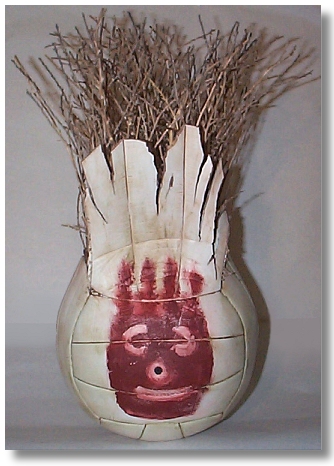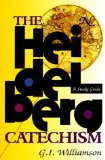 rom Yesterday’s Bible reading:
rom Yesterday’s Bible reading:
Man in his pomp yet without understanding is like the beasts that perish.
Psalm 49:20
Even the death of a family pet should remind us not to be proud.
 rom Yesterday’s Bible reading:
rom Yesterday’s Bible reading:
Man in his pomp yet without understanding is like the beasts that perish.
Psalm 49:20
Even the death of a family pet should remind us not to be proud.
 ouglas Wilson
ouglas Wilson at Blog and Mablog, has begun to post comments on the individual essays in the “NT Wright” issue of Table Talk. I know, this adds an extra layer of brain torture, but if you can take the strain, it’s well worth the effort. Wilson, when it first erupted, was very close to the New Perspective controversy. Because he floated in those circles many automatically lumped him in the group, partially because he rightly defended some of the issue, which was a bit unfair. He eventually outlived the slander among all but the most close-minded. For many reformed, however, he remains an odd character, I believe due at least in part to his post-mil views and his uber-sharp intellect defending it.
at Blog and Mablog, has begun to post comments on the individual essays in the “NT Wright” issue of Table Talk. I know, this adds an extra layer of brain torture, but if you can take the strain, it’s well worth the effort. Wilson, when it first erupted, was very close to the New Perspective controversy. Because he floated in those circles many automatically lumped him in the group, partially because he rightly defended some of the issue, which was a bit unfair. He eventually outlived the slander among all but the most close-minded. For many reformed, however, he remains an odd character, I believe due at least in part to his post-mil views and his uber-sharp intellect defending it.
Here are links to the two responses thus far, one to R. C. Sproul’s essay, and one to Dr. Mohler’s:
A Polecat In a Hollow Tree
Introspective Weird Beards in the Monasteries
If you are not a subscriber to Table Talk these posts won’t be of much use. Next month when the February issue appears online, you may be able to read some of the articles. The best bet is to see if you can order the February issue online, or find a friend who has it and is willing to share.
Happy Reading
 hat can I say? I have been re-orienting priorities, and haven’t posted anything here since back in the fall. The Heidelberg posts were all set up to automatically post since the very beginning. I would like to have set up something similar for 2010, but it didn’t happen. The “Friday Photo” posts, although quite fun for me, took a good bit of time to produce, so they fell away before all blossoms had completely left our landscape. I am sorry about that, but other priorities had crept in, and something had to go. We may post some landscape photos from time to time this year, but don’t expect much, and you won’t be disappointed. We will see what happens.
hat can I say? I have been re-orienting priorities, and haven’t posted anything here since back in the fall. The Heidelberg posts were all set up to automatically post since the very beginning. I would like to have set up something similar for 2010, but it didn’t happen. The “Friday Photo” posts, although quite fun for me, took a good bit of time to produce, so they fell away before all blossoms had completely left our landscape. I am sorry about that, but other priorities had crept in, and something had to go. We may post some landscape photos from time to time this year, but don’t expect much, and you won’t be disappointed. We will see what happens.
 If I ever get some free time in 2010, I would like to concentrate my posts on church music. Much of my thought has been provoked by posts this last year by Douglas Wilson on the subject. Rather than comment on his comments, here is a link to his category page on Musical Exhortation which lists all all of them, the first beginning in April of 2009. Start at the bottom (there are two pages at present) and work your way up for best results, although they can be read randomly with similar results. Much of what Wilson has to say will stretch your mind a good bit, but don’t shut him out just because he may step on your toes. He will make you think, and that’s good. I know many connected to leading and creating (and singing) church music don’t think so, but trust me, you will get use to it in time. It might do us all some good, eventually.
If I ever get some free time in 2010, I would like to concentrate my posts on church music. Much of my thought has been provoked by posts this last year by Douglas Wilson on the subject. Rather than comment on his comments, here is a link to his category page on Musical Exhortation which lists all all of them, the first beginning in April of 2009. Start at the bottom (there are two pages at present) and work your way up for best results, although they can be read randomly with similar results. Much of what Wilson has to say will stretch your mind a good bit, but don’t shut him out just because he may step on your toes. He will make you think, and that’s good. I know many connected to leading and creating (and singing) church music don’t think so, but trust me, you will get use to it in time. It might do us all some good, eventually.
(Third Part: Of Thankfulness—Questions 86-129)
 127. What is the sixth petition?
127. What is the sixth petition?
128. How do you close this prayer?
129. What is the meaning of the word Amen?
(Third Part: Of Thankfulness—Questions 86-129)

126. What is the fifth petition?
(Third Part: Of Thankfulness—Questions 86-129)
125. What is the fourth petition?
(Third Part: Of Thankfulness—Questions 86-129)
124. What is the third petition?
(Third Part: Of Thankfulness—Questions 86-129)
123. What is the second petition?
 otice how this whole definition turns on the word knowledge. Without the knowledge of God and his benefits, we have no reverence or love, and thus no piety. How can we know Him whom we seldom pray to, or read his word to us? Can we rely on feelings alone? Notice too the connection between piety and obedience, rather, notice the connection between the lack of these two qualities in the final words of this quote.
otice how this whole definition turns on the word knowledge. Without the knowledge of God and his benefits, we have no reverence or love, and thus no piety. How can we know Him whom we seldom pray to, or read his word to us? Can we rely on feelings alone? Notice too the connection between piety and obedience, rather, notice the connection between the lack of these two qualities in the final words of this quote.
By piety I mean that union of reverence and love to God which the knowledge of his benefits inspires. For, until men feel that they owe everything to God, that they are cherished by his paternal care, and that he is the author of all their blessings, so that nought is to be looked for away from him, they will never submit to him in voluntary obedience; nay, unless they place their entire happiness in him, they will never yield up their whole selves to him in truth and sincerity. — John Calvin, Institutes, 1.2.1.
(Third Part: Of Thankfulness—Questions 86-129)
122. What is the first petition?